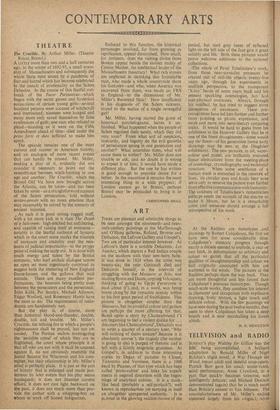THEATRE
A LITTLE more than two and a half centuries ago, in the winter of 1692-93, a small town- ship of Massachusetts• and subsequently the whole State were seized by a pandemic of fear and hatred which has become celebrated in the annals of irrationality as the Salem Delusion. In the course of this fearful out- break of the Furor Puritanicus—which began with the secret games and hysterical accusations of certain young girls—several hundred persons were accused of witchcraft and imprisoned; nineteen were hanged and many more only saved themselves by false confessions of guilt; one man who refused to plead—standing as it were on the Fifth Amendment ahead of time—died under the peine forte et dure inflicted to make him speak.
The episode remains one of the most curious and sinister in American history, and an analogue of more recent events that can hardly be missed. Mr. Miller, making a play of it, evidently did not consider it necessary to point out the resemblance between witch-hunting in one age and another: The Crucible, which the Bristol Old Vic have now brought across the Atlantic, can be taken—and has been taken by some--as a straightforward account of the Salem persecution, told without arriere-pensee with no more emotion than may reasonably be stirred by the memory of ancient injustice.
As such it is good strong rugged stuff,
P .
with a lot more kick in it than The Death of a Salesman: high-pitched but unfaltering, and capable of raising itself at moments— notably in the fearful outburst of hysteria which in the court scene marks the triumph of unreason and credulity over the rem- nants of judicial impartiality—to the proper point of making the scalp stir. It is done with much energy and talent by the Bristol company, who hurl archaic dialogue across an open set most ingeniously contrived to suggest both the timbering of New England frame-houses and the gallows that wait outside. There are many excellent per- formances, the honours being pretty even between the persecutors and the persecuted: John Kidd, Pat Sandys, Michael Allinson, Edgar Wreford, and Rosemary Harris have the most to do. The requirements of melo- drama are handsomely met. Reduced to this function, the historical personages involved, far from growing in significance, appear diminished. How small, for instance, does the visiting divine from Boston appear beside the sinister reality of Cotton Mather, the intellectual leader of the Massachusetts theocracy! What rich ironies are neglected in shrinking this formidable man, who made a whole countryside share his fantasies—and who, when America was recovered from them, was made an FRS in England—to the dimensions of Mr. Miller's Reverend Hale! How insufficient is his diagnosis of the Salem sickness, traced to the malice of a single revengeful girl!
Mr. Miller, having started the game of historical parallelograms, leaves it un- finished. What happened when the people of Salem regained their sanity, which they did very soon? From what soil of suspicion, insecurity, and bigotry do the evil growths of persecution spring in one generation and another? What nourishes them, what will cause them to wither? Mr. Miller does not trouble to ask, and no doubt it is wrong to expect it of him; it would have made a different play. But the one he has written is good enough to provoke desire for a better. In the meantime it remains the most interesting thing in a wide prospect; if. London cannot go to Bristol, perhaps Bristol may be persuaded to bring it to London.
CHRISTOPHER SMALL










































































 Previous page
Previous page